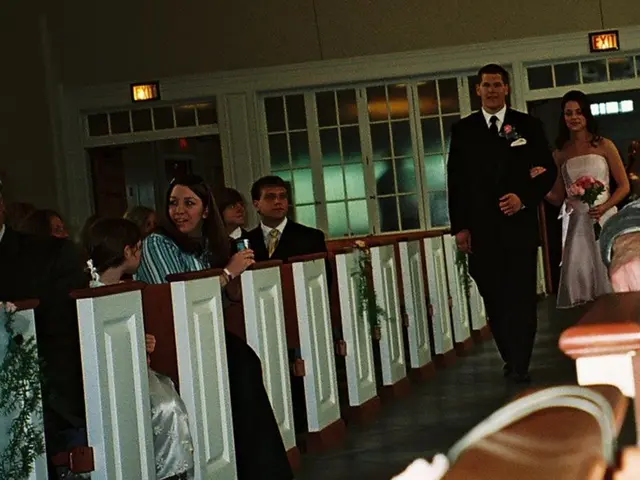Larger Than Average: Living with a Pack of Ten - "A Rewarding Chaos"
- *
- Sharing Life with Ten Siblings - "Extremely Rewarding Experience"
Meet the Hofstee clan, your average family... except for the staggering count of ten siblings. Nestled in Emsbüren, Lower Saxony, alongside parents Andrea (47) and Marc (48), seven brothers and three sisters reside in their cozy family home, boasting a lush little garden. The children arrived at a rapid pace: Julian (25), Laurin (23), Sara (21), Elisa (17), Jonathan (15), Lennart (12), Josua (10), Till (7), Caspar (5), and Aurelia (4) - all birthed under the watchful gaze of their doting parents.
What's it like to share your space with a swarm of siblings?
"Well, ya never feel lonely, that's a big upside," offers Julian, the eldest. "I've gotta say, having this many siblings has been a godsend, especially early on as the eldest with plenty of responsibilities piling up. Plus, I've honed my social skills like a boss." The background din, a mix of laughter, giggles, playtime, and storytelling, proves his point.
Julian ventured out on his own a few years back, embarking on an educational journey and now gainfully employed. "Striking up conversations, fitting in like a glove - it's natural as anything." He chuckles, "I've been making compromises since day one. Gotta say, having a large group of siblings is a chaotic, yet unbelievably rewarding experience."
But, finding solitude and relaxation can be a different ball game: "Little ones bursting into your room, talking, wanting to play - it happens frequently. And yeah, it can be a bit overwhelming, but you make time for 'em, 'cause that's what brothers and sisters do." He grins, "The bond we share - it's something special. There's no competition between us, no first or second place."
A Mixed Bag
Each sibling carries their unique place, says 17-year-old Elisa, or Lizzy. "We're not ranked one above the other - everyone is who they are, each with their own personality. And that's what matters." They stick together, a definite advantage.
"There were moments when I craved more attention," confesses Lizzy. But her parents always understood, she emphasizes. "One-on-one time with Mom and Dad means a lot to me. Quality moments are sometimes few and far between, but when they happen, they're priceless."
When the study grind kicks in, finding a quiet spot can prove a challenge, Lizzy notes. "Yet, there's always someone to bounce ideas off of and something to laugh about during family dinner." Over the years, she's come to appreciate even more the gift of a (literally) large family.
"More children could mean greater societal support"
Elisabeth Müller, from the Association of Large Families (KRFD) in Mönchengladbach, believes larger families could generate increased societal and political support. "Having fewer children is no longer fashionable or aspirational," she laments. Success is often measured by career achievements, travels, and personal endeavors. "Yet, large families are indispensable for social cohesion and the future of our nation."
The Federal Statistical Office reports that around 3.3 million minors in Germany grow up without siblings - approximately 25% of all children. Conversely, approximately 10.9 million children are reared with siblings, one being the most common (roughly 6.7 million), followed by two (around 2.8 million). A family with ten children like the Hofstees is increasingly hard to come by, with only about 1.3 million children living with three or more siblings as per the 2022 census statistics.
The two-child paradigm has long been the societal ideal, asserts Elisabeth Müller. Many couples tend to start their family-building ventures later, reducing the likelihood of having more children biologically. "High housing prices, scarcity of homes, lack of appreciation, and financial pressures make expanding families more challenging," she criticizes on Siblings' Day on April 10th.
Sometimes one child requires more care, sometimes the other, acknowledges family patriarch Marc Hofstee. For a large family, some things just aren't doable. "But our investment in our children is always worth it," he maintains.
The children are a close-knit bunch, Hofstee points out. "Each has their quirks - and they know each other's. They trust each other. We could also entrust the older ones with responsibilities." For him and his wife, its essential: "You can't follow a blueprint every time, a lot depends on the situation. Sometimes one child requires more attention than the other."
The older siblings debate politics in the kitchen, while the younger ones engage in their limited gaming sessions in the next room. The ten-year-old Josua asserts his gratitude for the large brood. "Being bored? Never a problem. Always someone to play with." Enough space? Check. In the living room, a playzone is cleared. The yard features a sprawling sandbox overflowing with toys.
Seven-year-old Till declares that there are only children in his class. "That wouldn't work for me. I wouldn't trade it, no way. I bet other kids would love to have as many siblings as I do. Maybe they're just jealous."
- In the heart of Emsbüren, Lower Saxony, the Hofstee siblings enrich each other's lives, embodying a unique bond reminiscent of Westphalia's community spirit.
- Despite the occasional challenges, the Hofstee family believes that larger families contribute to creating a supportive society, a notion echoed by the Association of Large Families in Mönchengladbach.
- Amidst the bustling household, the siblings find solace in the companionship and shared experiences, with each one cherishing the diverse dynamics within the community that is their family.








